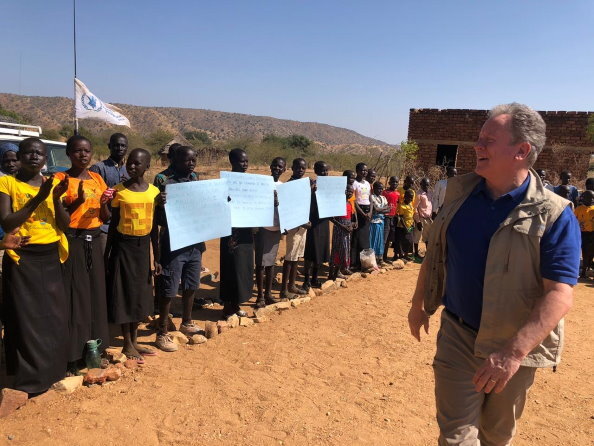WFP Executive Director with Sudan Prime Minister on historic visit to the Nuba Mountains in South Kordofan
The delegation was received by Sudan People Liberation Movement North (SPLM-N) leader, Abdulaziz Al-Hilu, and WFP employees from South Sudan. The Executive Director used his good offices to facilitate the first visit of Sudanese officials to non-government-controlled areas in South Kordofan in more than nine years.
The trip comes on the heels of a recent visit by Beasley to Kauda and Yabus in Blue Nile state which signalled significant improvement to humanitarian access in these conflict-torn areas which have been cut off from humanitarian assistance since 2011. This follows the Sudanese government’s commitment to unfettered humanitarian access.
“It’s great for WFP and the UN to see food and humanitarian assistance finally reaching the most vulnerable people in these areas,” said David Beasley, Executive Director of the World Food Programme. “Our negotiations for access have helped to bring all parties together, building trust and confidence which are vital for efforts to create long-term peace in every area in Sudan.”
While in Kauda, the delegation visited schools where WFP has started to implement a school feeding programme.
Following a rapid interagency assessment at the end of December, school feeding for primary school students was identified as a priority for Kauda and surrounding communities. School feeding is an entry point of assistance to newly-accessible areas with potential to increase access to education and nutrition in the longer term. WFP has prepositioned enough food for 13,000 primary school children in South Kordofan for the next three months.
This was made possible through the work of UN staff from Sudan, cross border assistance from South Sudan and the approval of the Government of Sudan to move food across the border between the two countries.
WFP and its partners are ready to address rising humanitarian needs, while helping strengthen social protection systems to respond to the challenging economic situation and reduce the impact of planned subsidy reforms. WFP supports internally displaced people, refugees, and vulnerable people through a mixture of cash, food and vouchers. More robust social safety nets are needed to cushion them against the impact of macro-economic reforms.
Additional funding is needed to enable WFP to meet the increasing humanitarian needs across Sudan.
For quality photos and video please contact David.Orr@wfp.org
The United Nations World Food Programme - saving lives in emergencies and changing lives for millions through sustainable development. WFP works in more than 80 countries around the world, feeding people caught in conflict and disasters, and laying the foundations for a better future.
Follow us on Twitter @WFPChief, @WFP_MENA, @WFP_AR, @WFP_media, @WFP_Sudan




